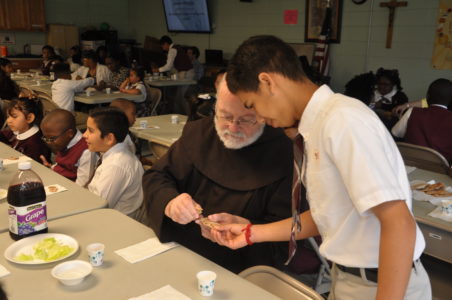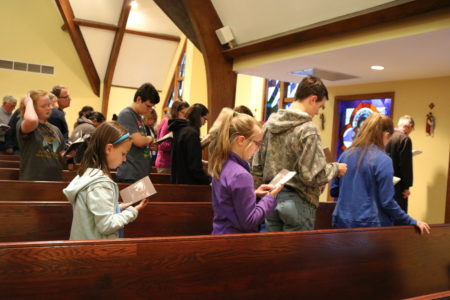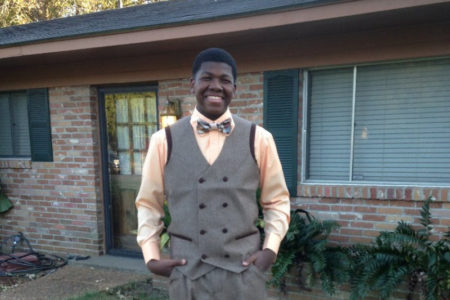RIPLEY – Several dozen teenagers from several area parishes attended a retreat at St. Matthew Parish offered by the National Evangelization Team (NET) on April 21. NET teams travel across the country to lead Catholic retreats for young people. (Photo by Madeleine Hale)
Category Archives: Youth
Holy Week across the Diocese

GREENWOOD – Sixth-grader Daniel Varges (right), shares unleavened bread with Father Joachim “Kim” Studwell, OFM, during a Seder meal at St. Francis of Assisi School on Wednesday, March 28. (Photo by Cherrie Criss)
The Way of the Cross, also known as Stations of the Cross, is a powerful reflection on the passion of Christ. This year, Mississippi Catholic received photos from youth groups and schools all across the diocese who offered their communities a live reenactment of the stations. Not all the photos would fit in the printed version, so more are posted to galleries on the website: www.mississippicatholic.com.
As the Easter season progresses, please remember to send your First Communion and Confirmation photos to editor@mississippicatholic.com for inclusion in the Spring Sacraments issue.
COLUMBUS – Annunciation School eighth-grader Ren Kitko, carries the cross as Jesus during live stations of the cross for the school community. (Photo by Katie Fenstermacher)
NEW ALBANY – Cody Carson depicts Christ as the youth of St. Francis of Assisi Parish lead an outdoor live stations of the cross. They started the tradition in 2012, inviting anyone of any faith to join in this memorial of Christ’s passion.
This year, two-dozen parishioners participated in the event. (Photo by Claudia Murguia)

MERIDIAN – Pilate questions Jesus as St. Patrick School first graders, performed a live Stations of the Cross Wednesday, March 28, for the school. (Photo by Mary Yarger)
GREENVILLE – Live stations of the Cross are a tradition for middle-schoolers at St. Joseph School. In left photo, Jesus falls the second time. (Photo by Missi Blackstock)

PEARL – St. Jude Parish youth participated in Stations of Cross led by Father Lincoln Dall, the front row is Molly, Katie, Jack, and Charlotte Riordan. The next row back is Craig Millette and John and Mary Beth VanLandingham. (Photo by Tereza Ma)
Lucky day for young people
By Abbey Schuhmann
COVINGTON, La. – On Saturday, March 17, the Feast of St. Patrick, teens and adult leaders from 22 parishes from around the Diocese of Jackson traveled to St. Joseph Abbey and Seminary College for the 2018 Abbey Youth Festival (AYF). The theme for the day was “Arise” coming from the gospel for that weekend.
The 2018 AYF logo was designed by seminarian, Luke Mayeux of the Diocese of Beaumont. The image is an imitation of the Dom Gregory de Wit painting in the apse of the St. Joseph Abbey Church which hosted AYF. Inspired by St. Patrick’s Breastplate prayer, the logo exemplifies the Christo-centric aspect of the prayer, while the 12 stars symbolize discipleship as well as the Blessed Mother inviting us to her son. The image of the Risen Lord invokes the message found in the Gospel from the day: “And when I am lifted up from the earth, I will draw everyone to myself.” John 12: 20-33.
The seminarians at St. Joseph Seminary College play a vital role in the production of AYF including Andrew Bowden and Tristan Stovall from the Diocese of Jackson. This year’s festival brought in more than 3,000 young people from Mississippi, Louisiana, Texas, Alabama, Florida, Georgia and Tennessee. The festival always boasts a packed schedule that includes faith-filled music, prayer, catechesis, fellowship and fun. Showers on Friday did not make for ideal conditions, but organizers made accomodations and the day went forward as scheduled. For the first time, much of the festival was hosted on the main campus. Another new addition to the program schedule was the opportunity to attend breakout sessions throughout the day. Father Brad Doyle and Father Bryce Sibley offered the keynote presentation. Emily Wilson presented the breakout session for teen girls while Austin Ashcraft, Joe Bass, Father Doyle and John Finch led the session for teen guys.
Adult leaders had the opportunity to attend a session discussing “Ministry in the Modern Age.” The Vigil Project and Ike Ndolo, Catholic song-writers and recording artists, entertained the crowd with two different concerts. The Vigil Project also provided music for Mass and Eucharistic adoration. All participants had the opportunity throughout the day to visit different vendor booths including religious orders and communities from all around the country. Because of the venue change, groups could tour the beautiful Abbey church on campus. Many teens and adults took advantage of the opportunity to receive the sacrament of Reconciliation.
This year’s prayer chapel area featured an exhibit of Eucharistic miracles from around the world. The day wrapped up with Mass and candlelight adoration – the highlight of the event for most participants. Archbishop Gregory Aymond of the Archdiocese of New Orleans celebrated the Mass; the homilist was Father Colm Cahill of the Archdiocese of New Orleans. The common theme throughout the day was for teens to “take action” in their faith. Each person is called to something great and now is the time to “Arise” and heed the call.
The Luck of the Irish kept the rain away for the majority of the day, while the ground was still very muddy from the previous day’s showers; most teens embraced the day and the circumstances.
Abbey Youth Fest is an excellent opportunity for teens to see the bigger church and enjoy fellowship with other young Catholics. This was the eighth year for thisdiocese to sponsor a trip and it won’t be the last. Make plans to participate in the 2019 event scheduled for Saturday, March 23rd. For more information visit www.abbeyyouthfest.com or contact the Office of Youth Ministry at 601-949-6934 or Abbey.Schuhmann@jacksondiocese.org
(Abbey Schuhmann is the coordinator of youth ministry for the Diocese of Jackson.)
Called To Serve: Confirmation retreat welcomes 200 youth
By Fran Lavelle
CLINTON – The day began like a normal Saturday morning in the late winter. There was a chill in the air, but the sun was shining. The possibilities of what one can do on any given Saturday literally are endless but high school youth from around the diocese had one destination in mind, the Diocesan High School Confirmation Retreat (DHSCR). Nearly 200 young people attended the DHSCR at Camp Garaywa in Clinton. The weekend was filled with opportunities for our Confirmation candidates to grow closer to God and affirm their decision to be confirmed. In addition to the adult catechist and chaperones who accompanied the youth, a group of college students were also present to lead group activities and serve as small group leaders.
The theme for the retreat was “Called to Serve.” Leaders challenged students to consider how they are being called to serve in their homes, community and in the world. Using the example of the Holy Family, Father Rusty Vincent encouraged the youth to serve with the heart of Mary. Father Rusty reminded the youth that, “From what we are able to determine, Mary was 15-18 years old when she said ‘Yes’ to be the Mother of Jesus.” We learn by example and Mary provides us all with an example of selfless service.
The youth were asked to write a letter to someone who has modeled service and thank them for their witness.
Bishop Joseph Kopacz celebrated Mass Saturday evening. He shared with the youth how important the letters they write him really are and that he reads them all. In addition to asking to be confirmed, the letters often describe the individual journey to deepening their faith. Bishop Kopacz also encouraged the young people to use their voices to be the change in the world that we desperately need. He shared a story from his recent visit to the Holy Land about being where Jesus preached the Sermon on the Mount, commonly known as the Beatitudes. In them, Jesus unveils the foundations and character of life in the Kingdom of God. Bishop Kopacz used the example of the young people in Florida who are challenging local, state and national leaders to enact sensible gun laws. “Blessed are the peacemakers,” he reminded them, “for they will be called the sons of God.”
Saturday night John Finch, a native of Pearl River, Louisiana, led the youth in praise and worship through his gift of music and song.
Sunday, Brent and Kristin Lape of Gluckstadt St. Joseph Parish shared how they were called to service. The couple met at Mississippi State University where they were both active in campus ministry. They fell in love and after college got married. The birth of their first child, Lily, totally changed the trajectory of this young couple’s lives as they came to understand Lily’s Down Syndrome. Together they began “Running Up for Downs” an annual race in metro-Jackson. They have used this journey as a platform to help spread awareness and acceptance for people with Down Syndrome within our community. They invited the young people to find something they are passionate about and use their particular gift. The youth were asked to share a service to the community that they found to be particularly meaningful.
John Finch rounded out the retreat with a talk on service to the world. He described his own journey of faith and how he was able to take ownership of his faith through Confirmation. His talk was reminiscent of a Mother Teresa quote, “I alone cannot change the world, but I can cast a stone across the waters to create many ripples.” The young people were asked to consider the ways their actions create ripples around the world. They examined international aid organizations like Catholic Relief Service which provide for the marginalized and the poor around the world.
At the end of the weekend it was quite apparent that service is at the heart of the gospel. The youth were challenged to make service an integral part of their lives going beyond building a resume for college or getting confirmed. “The Simple Path…Silence is Prayer, Prayer is Faith, Faith is Love, Love is Service, The Fruit of Service is Peace.” – Mother Teresa
(Fran Lavelle is the director of Faith Formation for the Diocese of Jackson.)
Deanery Youth Day in Meridian
MERIDIAN – On Saturday, March 3, Catholic Youth from Kosciusko, Philadelphia and Meridian enjoyed a fun-filled day that included volleyball, basketball and dodgeball at the St. Patrick Family Life Center in Meridian.Additionally the youth enjoyed a pizza lunch along with snacks and drinks throughout the day. DJ, Frank Polizzi, provided music and special effects during each of the games. Special thanks to Father Augustine Palimattam (Holy Cross) and the adults who chaperoned the event and made the day happen. (Photo by John Harwell)
St. Joe Alumna directs ‘Bye Bye Birdie’ at her Alma Mater
By Leila deGruy
MADISON – St. Joseph Catholic School alumna Leslie Ann Harkins is leading the theater department’s production of Bye Bye Birdie, which she starred in as a student in 2004. The show opens Thursday, April 5, with performances at 7 p.m. on Thursday, Friday and Saturday, and a 2 p.m. matinee on Saturday, April 7. We asked Harkins about her role as a teacher and director, and how the production has changed since her high school days.
Q: What made you want to teach theater at St. Joseph?
A: I had a lot of great memories and mentors growing up in Mississippi, especially in the theatre world. I could not think of a better way to give back to the place that gave me so much than to return to my alma mater and work with students who are as passionate about the arts as I am.
Q: What is Bye Bye Birdie about?
A: Bye Bye Birdie is a story that is based on the pop-star Conrad Birdie. His character is very much like Elvis Presley. He goes into the army, and the story shows how that decision impacts his manager, his manager’s girlfriend, his manager’s mother and this whole town of Sweet Apple, Ohio.
Q: What can you tell us about this year’s production of Bye Bye Birdie?
A: This is by far the largest production I have put together at St. Joe. There are 78 people involved including 14 student and professional musicians in our live orchestra, six backstage crew members, eight working on lighting and sound, and the rest make up our student cast. The majority of our cast and crew are students at the school. We are very fortunate to have talented performers, musicians and technical crew as part of our student body.
Q: How will this year’s production be different from 2004, when you played the role of Helen?
A: When I played the role of Helen while in high school at St. Joe, the show was performed in our school gym. The most significant difference between our 2004 show and this year’s show comes in the form of our Fine Arts facility that was built nine years ago. The facility offers a professional and state-of-the-art experience for both the actors and the audience. To see this production on the “big stage” versus the gym floor is a very exciting thing for me.
Q: Can you tell us about your students and what makes this year’s Bye Bye Birdie cast and crew so special?
A: The theatre experience at St. Joe is very special for a number of reasons. First, our cast and crew are comprised of students from seventh to 12th grade. It is one of the few opportunities that all students have to come together and represent the entire student body. The younger students not only get the opportunity to experience the entire audition, rehearsal and performance process, they also get to benefit from strong mentorship from the older students who also have spent years on the stage. This inclusive process is very special and somewhat unique in high school theater.
To purchase tickets for Bye Bye Birdie, visit www.stjoetheatre.booktix.com. For more information visit www.stjoebruins.com or call 601-898-4800.
(Leila deGruy is a junior at Madison St. Joseph School.)
Greenville school rallies around student in need

Aries Cotton
By Missi Blackstock
GREENVILLE – The St. Joseph School community is rallying around one of their own this year, rolling up their sleeves and pulling up to the table. Aries Cotton is a 12-year-old eighth grader at St. Joseph School. At the beginning of the school year, Cotton began having night sweats and loss of appetite. He later passed out during football practice. The doctor did blood work and discovered that he had an abnormal blood count, very low immune system, and a swollen spleen. The doctor referred him to the children’s entomologist/hematologist at Batson Children’s Hospital in Jackson.
On Friday, October 6, 2017, Cotton was diagnosed with Acute Lymphoblastic Leukemia. The following Monday, he underwent surgery to place a chemo-portal in his chest. A biopsy was done on his bone marrow to determine how many cancer cells were present. The results showed 85 percent cancer cells in his bone marrow, but no cancer cells in his brain. Cotton has been cancer-cell-free since December but must continue maintenance chemo for the remainder of the year.
Because Cotton’s cancer includes the Philadelphia Chromosome, the teen must take a costly chemotherapy pill. The Philadelphia chromosome has been known to destroy a patient’s bone marrow, but this damage may be prevented by taking this medication. Funds are being raised to help cover travel and medical expenses during his treatments and recovery. Cotton must travel from one to four days each week to Batson Children’s Hospital for Induction A, sometimes becoming in-patient for days on end. His mother had to give up her job to care for him, finances have been a great strain on the family.
Cotton’s eighth-grade class has held three fund-raisers. They have sold bracelets (which are still for sale for $5 in the front office), #AriesStrong T-shirts as well as hosting a pancake breakfast on Saturday, March 3. The senior class, of which Aries’ brother Reggie is a member, has also held two bake sales. Because of generous donors, 100 percent of all proceeds have been given to the Cotton family.
More than 65 pints of blood have already been donated by St Joseph students, parents and the local community. Anyone wishing to help, may donate at their local Mississippi Blood Services drawing station or any mobile drive by using the code: DQ49 or call the school at 662-378-9711.
College students serve homeless in Jackson
By Dawn McGinley
JACKSON – Volunteers from Mississippi State University’s Catholic Campus Ministry have started traveling to Mississippi’s capital city once a month to meet with and visit the homeless. “The project was inspired by our trip to the SEEK Conference in San Antonio, Tx in January 2017. There was a group at the conference named Christ in the City from Denver, Colorado,” explained Dawn McGinley, campus minister at Starkville St. Joseph Parish. “Their goal is to talk to the homeless – to connect with them and help them to see they have dignity. This inspired our group, so that is our goal. We bring relief bags which include basic necessities such as socks, lip balm, toothpaste, toothbrushes, soap, shampoo, underwear, tissues, etc.,” she added.
The college students and St. Joseph parishioners have also formed a group that gets together every Monday night to recycle plastic grocery sacks into sleeping mats. The bags are flattened and cut and then crocheted or knitted together to form a mat a homeless person can use.
“We normally meet people at Smith Park but it has been closed for a few months,” said McGinley. “We are in the process of reorganizing our approach,” she said.
St. Anthony Students take to the stage to honor Dr. Seuss
MADISON – St. Anthony fifth and sixth-grade students performed a Dr. Seuss-themed play called “Why fit in when you can stand out.” The students portrayed office supplies and other silly objects as part of the production.(Photo by Kristan Beatty)
Schools celebrate Dr. Seuss by Reading Across America
 GREENVILLE – Our Lady of Lourdes sixth grader Elese Serio reads to Charles Beckham. The pair are dressed as characters from the Dr. Seuss book “The Cat in the Hat” to honor the author’s birthday. Schools across the nation marked the day with Read Across America activities. At Lourdes, students brought in gently used books in the weeks before Friday, March 2. On that day, students could ‘shop’ the used books to find one new to them. (Photo by Kathy Gower)
GREENVILLE – Our Lady of Lourdes sixth grader Elese Serio reads to Charles Beckham. The pair are dressed as characters from the Dr. Seuss book “The Cat in the Hat” to honor the author’s birthday. Schools across the nation marked the day with Read Across America activities. At Lourdes, students brought in gently used books in the weeks before Friday, March 2. On that day, students could ‘shop’ the used books to find one new to them. (Photo by Kathy Gower)
 JACKSON – Sister Thea Bowman School student Caleb Johnson reads to classmates on Read Across America Day, Friday, March 2. The students are wearing Cat in the Hat costumes they made themselves. (Photo by Shae Robinson)
JACKSON – Sister Thea Bowman School student Caleb Johnson reads to classmates on Read Across America Day, Friday, March 2. The students are wearing Cat in the Hat costumes they made themselves. (Photo by Shae Robinson)
